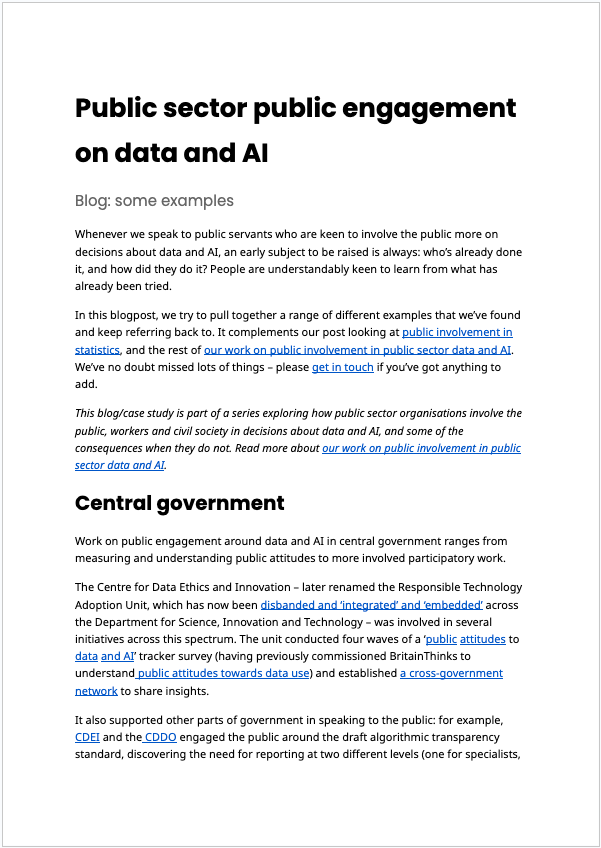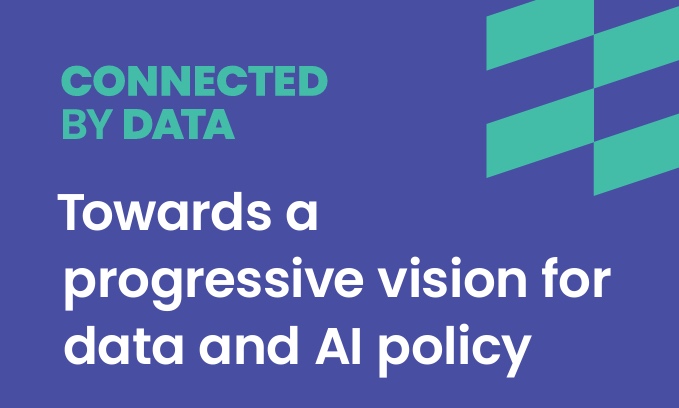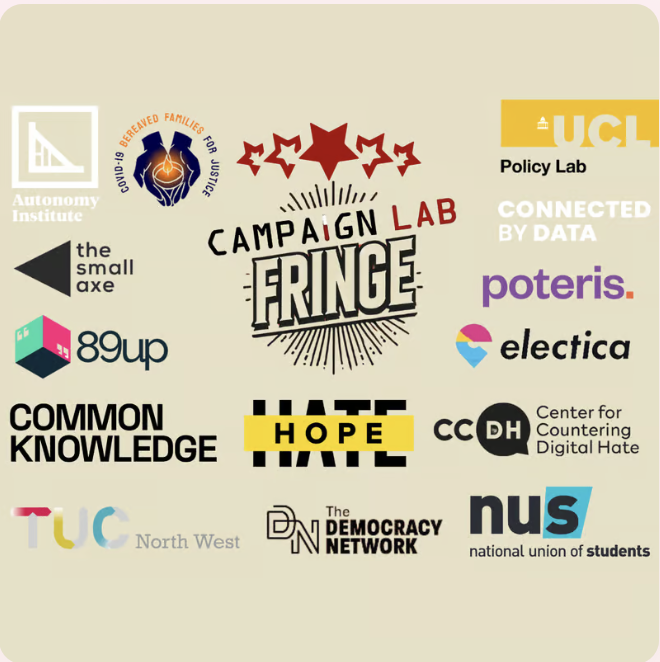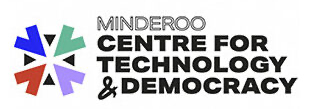Civil society
Building countervailing power through collective action


For data and AI to work for us all, we need to rebalance away from narratives, policy and practices dominated by narrow perspectives and corporate incentives.
We’re working to organise civil society as a source of countervailing power to shape a progressive landscape for technology and society. We bring together the Data and AI Civil Society Network and collaborate with allies on events and projects. This includes building community power on data, public policy advocacy, and key areas such as work, education and justice.
Whenever we speak to public servants who are keen to involve the public more on decisions about data and AI, an early subject to be raised is always: who’s already done it, and how did they do it? People are understandably keen to learn from what has already been tried.
This blog/case study is part of a series exploring how public sector organisations involve the public, workers and civil society in decisions about data and AI, and some of the consequences when they do not. Read more about our work on public involvement in public sector data and AI.
Welcome to the Data and AI Civil Society Network Election Hub. Click through to the Google Doc below where you can find – and add! – links to manifestos from civil society organisations and other key election resources.
CONNECTED BY DATA is conducting collaborative work on building a progressive vision for data and tech, with the aim of influencing party manifestos in the run up to the next General Election. As part of that, we are undertaking a project to consider:
- What principles should underpin progressive data, digital and technology policy with a focus on the impact on citizens, consumers and communities.
- What specific policies could look like to deliver these.

The Data and AI Civil Society Network brings together diverse civil society organisations and campaigners to share and collaborate on policy, campaigns and advocacy on data and AI.
Participants in the Network work for data and AI related policy and practice that is democratic and inclusive, that upholds the highest standards of human rights and brings benefits to communities, societies and the environment.
Find out more and join the Network here: https://data-and-ai-cso-network.org/
In a comprehensive regular posting - up to twice a month - data policy maestro Gavin Freeguard pulls together all the news, views and gossip from data and AI policy land, with a UK focus.


AI and data are everywhere in our political discourse and our everyday lives. Shaped properly, the benefits brought by such new technologies could lead to public benefit, with better services and better policies allowing us all to live better lives. But power over AI and data is currently concentrated in a small number of large companies working in their own interests, apparently untouched by questions of democratic accountability, and politicians easily seduced by hype or slowed by panic.

Save the data for the 2026 edition of the Participatory AI Research and Practice Symposium online and in-person alongside the India AI Impact Summit.


This session is part of The Campaign Fringe, an all-day gathering of progressive campaigners and experts exploring bold ideas, practical tools, and best practice. Held on September 29th at the Camp and Furnace Liverpool, The Campaign Fringe is where effective campaigners share what works.
In the debut session, Campaign Lab is bringing together experts to unpack the risks and possibilities of AI as it relates to democratic campaigning.
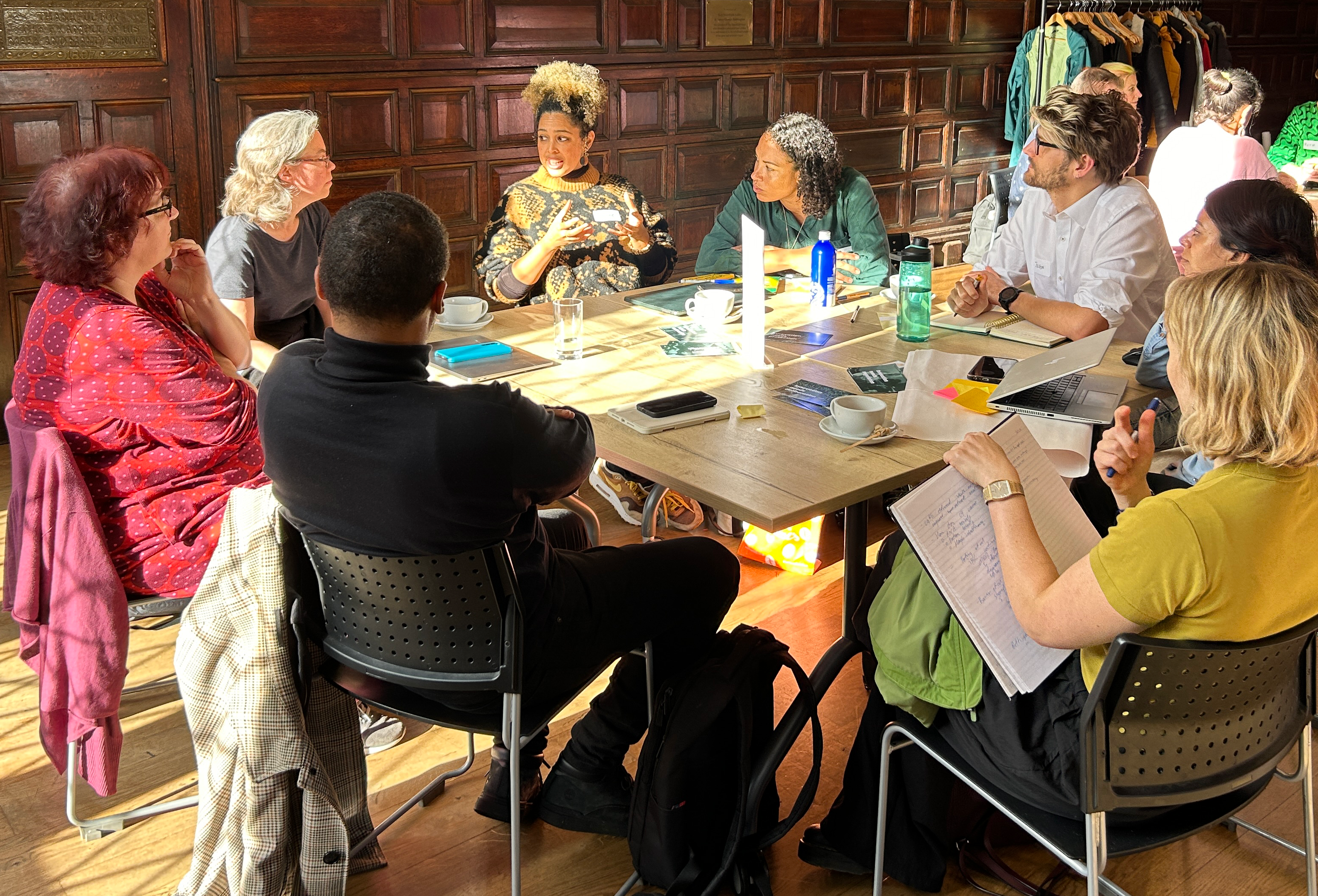
This event is being hosted by Simon Cross, Senior Subject Matter Expert & AI Policy Lead for the Church of England simon.cross@churchofengland.org
Tired of short ‘networking’ slots in events? You are not alone. Tired of video calls? Fancy a break from Slido, and Miro boards, and looking for your virtual Zoom hand? Me too. Me, so very too!
Wonder who else is out there, who are the other good guys working on AI?
Well here’s a chance, the time, and a space needed to meet and start to get to know a wide range of others working on AI from a civil society perspective. A chance to find other good people doing good work on some of the same wicked problems you are. A chance to do some encouraging and to be encouraged, to find common cause.
You are cordially invited to the first (and possibly last ever) AI and Civil Society WHO/HOW
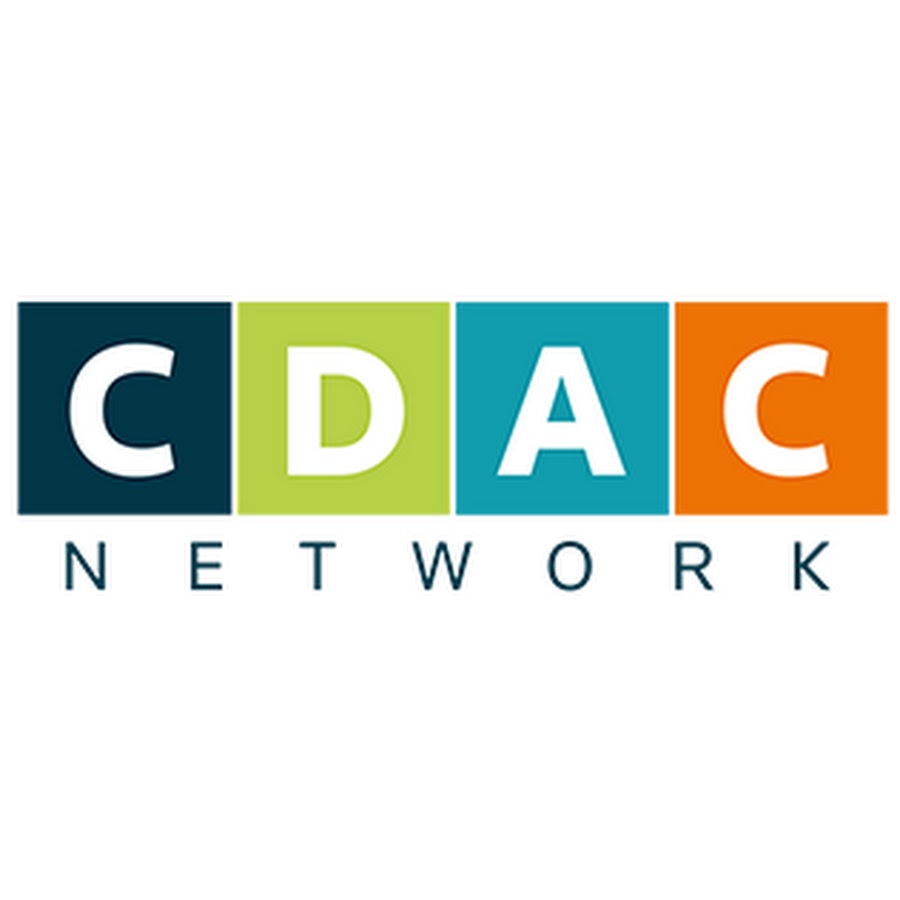
Tim attended a roundtable at the Foreign, Commonwealth and Development Office organised by the SAFE AI project.
Amidst a context of unprecedented crisis for the humanitarian system, facing growing demand, devastating cuts to funding and programmes, and erosion in respect for international humanitarian law and norms, the round table explored the additional challenge of humanitarian sector responses to AI.
I was asked to provide a few minutes of input during discussions on Power & Participatory AI, notes for which are reproduced below (edited based on delivery and to expand on a few points with links).

Artificial intelligence is changing our world: but how can the public shape our AI future? This invite-only event will explore practical grassroots and global approaches to including public voices in the development and governance of AI.
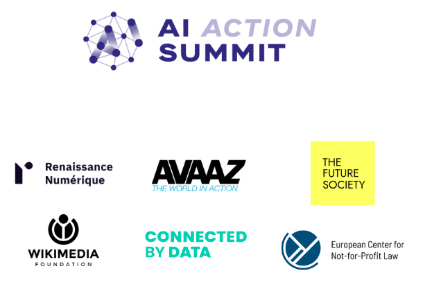
The Artificial Intelligence (AI) Action Summit will take place in Paris on 10th and 11th February 2025. It will gather Heads of State and Government, leaders of international organisations, CEOs of small and large companies, representatives of academia, non-governmental organisations, artists and members of civil society. On this occasion, Renaissance Numérique, The Future Society, Wikimedia France, the Avaaz Foundation, Connected by Data and the European Center for Non-for-Profit Law are glad to invite you to their civil society side-event.

February 8th (Paris) 2025
An independent symposium taking place online and person organised to coincide with the Paris AI Action Summit (10th - 11th Feb 2025) as a space to present research and case studies on the state of the art in participatory development and governance of AI, and to build stronger connections across the field.
| 🔗 Register | Draft agenda |

An independent symposium taking place online and person organised to coincide with the Paris AI Action Summit (10th - 11th Feb 2025) as a space to present research and case studies on the state of the art in participatory development and governance of AI, and to build stronger connections across the field.
| 🔗 Register | Draft agenda |
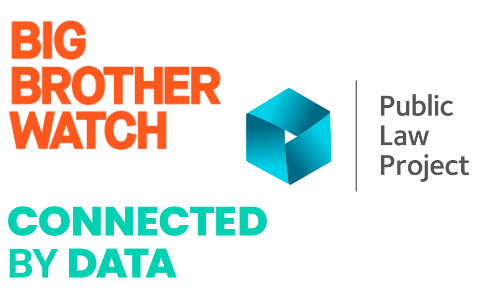
AI and digitalisation is rapidly changing how public services are delivered, with the government making the public sector use of AI a key priority.
Adam will be speaking on a panel hosted by Autonomy Institute at the Campaign Fringe of the Labour Conference, focused on campaigning on and with technology.


What could progressive technology policy look like for the new government in the UK?
To answer this question, we worked alongside Promising Trouble, the Minderoo Centre for Technology and Democracy at the University of Cambridge and ZoomInfo to bring together more than 60 representatives from civil society, academia, industry, policy and government.
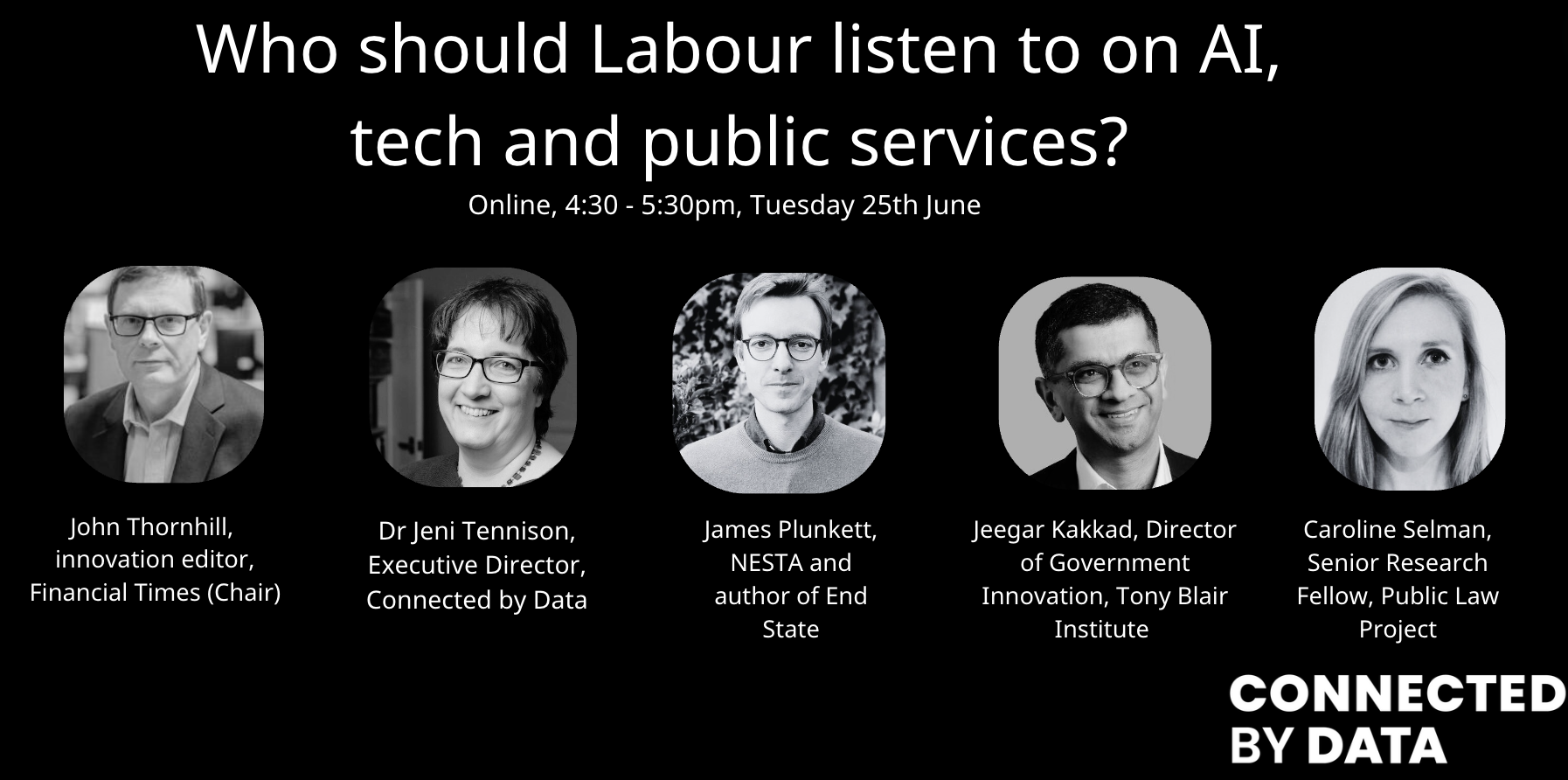
On Tuesday 25 June, Connected by Data hosted a Question Time-style event on a possible Labour government’s approach to data and AI in public services. You can watch recording of the event on our YouTube channel.
The Technology & Democracy Conference was organised by the Minderoo Centre for Technology and Democracy, which is an independent team of academic researchers at the University of Cambridge, who are radically rethinking the power relationships between digital technologies, society and our planet.
I spoke on the Firestarter Panel (on the first day) entitled “What are the Stakes for Technology & Democracy?”


Almost every modern policy reform relies on new data systems, and increasingly involves technologies labelled as Artificial Intelligence (AI) to make and shape decisions. Whether that’s education, health, benefits, housing, social care, work, policing, democratic engagement or a multitude of other areas.


The week before the UK’s AI Safety Summit we hosted a more closed Connected Conversation (to enable a safe space for honest conversation). The attendees, largely from civil society organisations, discussed the framing of the Summit and how “safety” is defined.
The notes of this connected conversation are only shared with participants.
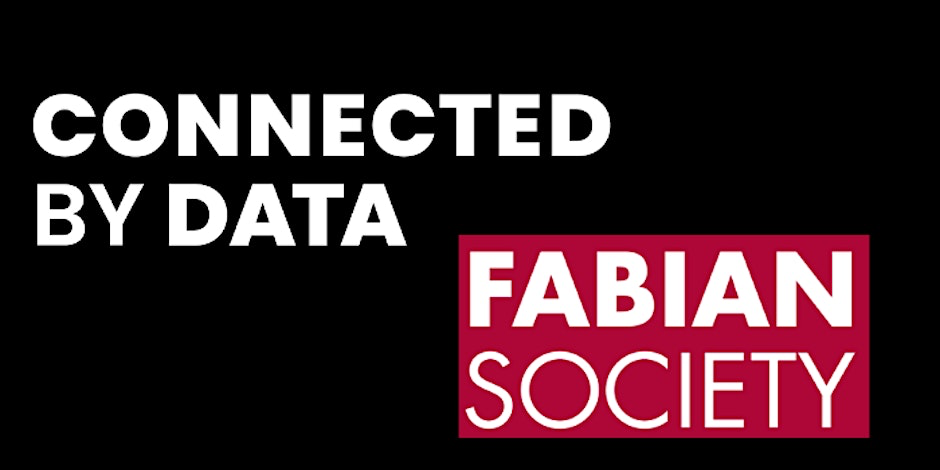
AI, data rights, the power of big tech, online safety… digital, data and technology policy is breaking into the political mainstream like never before. Any incoming Labour government will need to make the most of the opportunities afforded by new tech and the better use of data to deliver on its industrial strategy and public services plans – while protecting the public against the risks, hype and vested interests. So what should a Labour administration do – and not do?

How can we protect and empower communities in an era of artificial intelligence – and how should the Green Party approach the governance of data and AI? These were the overarching questions posed by our executive director, Jeni Tennison, to Natalie Bennett (former leader of the Green Party and now a member of the House of Lords) and Andy Stirling (Professor of Science and Technology Policy at the Science Policy Research Unit at the University of Sussex) at the Green Party conference in Brighton.

On Thursday 9 March 2023, CONNECTED BY DATA, working with Labour Together, convened a workshop with experts from civil society (and Labour advisers) to consider:
- what principles should underpin progressive data, digital and technology policy
- what some specific policies could look like
Recent news
- More than 100 UK and international organisations, experts and campaigners sign open letter to Rishi Sunak
- Groups warn that the “communities and workers most affected by AI have been marginalised by the Summit.”
- “Closed door event” is dominated by Big Tech and overly focused on speculative risks instead of AI threats “in the here and now”- PM told
- Signatories to letter include leading human rights organisations, trade union bodies, tech orgs, leading academics and experts on AI
